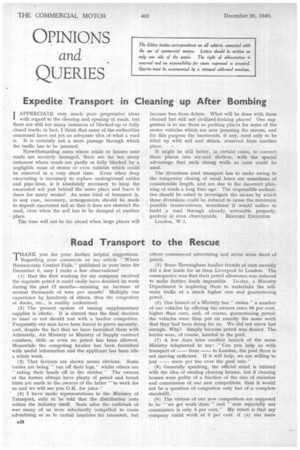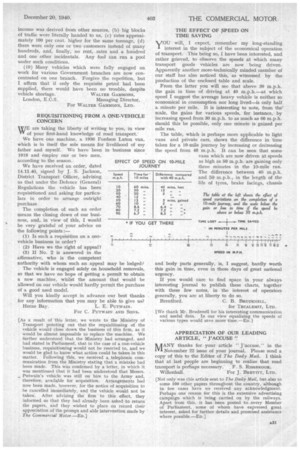Road Transport to the Rescue
Page 30

Page 33

If you've noticed an error in this article please click here to report it so we can fix it.
THANK you for your further helpful suggestions.
I Regarding your comments on my article "Where Bureaucratic Control Fails," published in your issue for December 6, may I make a few observations?
(1) Had the fleet working for my company received the requisite petrol it could easily have doubled its work during the past 12 months—meaning an increase of several thousands of tons per month? -Multiply our experience by hundreds of others, then the congestion at docks, etc., is readily understood.
. (2) The present system of issuing -supplementary supplies is idiotic. It is absurd that the final decision to issueor not should rest with a haulier competitor. Frequently our men have been forced to prove necessity, and, despite the fact that we have furnished them with Admiralty, Air Ministry or Ministry of Supply contract numbers, little or even no petrol has been allowed. Meanwhile the competing haulier has been furnished with useful information and the applicant has been idle a whole week.
(3). That favours are shown seems obvious, Some lorries are being "run off their legs," whilst others are " eating their heads off in the stables." The owners of the former always have plenty Of petrol and broad hints are made to the owners of the latter "to work for us and we will see you O.K. for juice."
.(4) I have made representations to the Ministry. of Transport, only to be told that the distribution rests within the industry itself. Soon after the outbreak of war many of us were reluctantly compelled to cease advertising so as to curtail. inquiries for transport, but
others commenced advertising and never seem short of petrol.
(5) Some Birmingham haulier friends of ours recently did a few loads for us from Liverpool to London. The consequence was that their petrol allowance was reduced to make further loads impossible. To-day, a Ministry Department is imploring them to undertake the selfsame traffic -at a much higher rate and guaranteeing petrol.
(6) One branch of a Ministry has " stolen ." a number of our vehicles by offering the owners rates 50 per cent.. higher than ours, and, of course, guaranteeing petrol; the vehicles were then put on exactly the same work that they had been doing for us. We did not moVe fast enough. Why? Simply because petrol was denied. The lorries were, of course, handed to the pool.
(7) A few days later another branch of the same Ministry telephoned to say: " Can you help us with transport of — from — to London, the pool there is not moving sufficient. If it will help, we are willing to pay more per ton over the pool rate."
(.8) Generally speaking, the official mind is imbued with the idea of strafing clearing houses, but if clearing houses were guilty of a fraction of the sins of omission and commission of our new competitors, then it would not be a question of congestion only but of a complete standstill.
(9) The virtues of our new competitors are stipposed to be "we get work done" and " note esPeeially our commission is only 5 per cent." My retort is that my company could work at 5 per cent. if (a) our main income was derived from other sources, (b) big blocks Of traffic were literally handed to us, (c) rates approximately 100 per cent, higher for the same tonnage, (d) there were only one or two customers instead of many hundreds, and, finally, no rent, ,rates and a hundred and one other incidentals. Any fool can run a pool under such conditions.
(10) Many vehicles which were fully engaged on work for various Government branches are now concentrated on one branch. Forgive the repetition, but I affirm that if only the requisite petrol had been supplied, there would have been no trouble, despite
vehicle shortage. WALTER GAIVIMONS, London, E.G.2. Managing Director. For WALTER 6AMMONS, LTD.
REQUISITIONING FROM A ONE-VEHICLE CONCERN
WE are taking the liberty of writing to you, in view of your first-hand knowledge of road transport.' We have one machine, a 1936 Fordson Luton van, which is in itself the sole means for livelihood of my father and myself. We have been in business since 1918 and employ one or two men, according to the season. EFFECT We have received an order, dated 14.11.40, signed by J. S. Jackson, District Transport Officer, advising us that under the Defence (General) Regulations the vehicle has been requisitioned and asking for particulars in order to .arrange outright purchase.
The completion of such an order means the closing down of our business, and, in view of this, I would be very grateful of your advice on the following points :— (1) Is such a requisition on a onevehicle business in order?
(2) Have we the right of appeal?
(3) If No. 2 is answered in the affirmative, who is the competent authority with whom such an appeal may be lodged?
The vehicle is engaged solely on household removals, so that we have no hope of getting a permit to obtain a new machine, whilst the amount that would be allowed on our vehicle would hardly permit the purchase of a good used model.
Will you kindly accept in advance our best thanks for any information that you may be able to give us?
Speed m.p.h.
Time for 10 miles
10 60 mins.
20
30 „
30
20 „ 40 .
IS
„
SO 60 12 .. 10 „ 70
8,6 „
80
7.5 „
90
6.7 „
ry
Herne Bay. L. E. PUTWAIN.
For C. P UTWAIN AND SONS.
[As a result of this letter, we wrote to the Ministry of Transport pointing out that the requisitioning of the vehicle would close down the business of this firm, as it would be almost impossible to replace the machine. We further understood that the Ministry had arranged, and had stated in Parliament; that in the case of a one-vehicle business, requisitioning would not be resorted to, and we would be glad to know what action could be taken in this matter. Following this, we received a .telephonic communication from the Ministry stating that a mistake had been made. This was confirmed by a letter, in which it was mentioned that it had been understood that Messrs. Putwain's vehicle was still on hire to the Army and, therefore, available for acquisition. Arrangements had now been made, however, for the notice of acquisition to he cancelled immediately, and the vehicle would not be taken. After advising the firm to this effect, they informed us that they had already been asked to return the papers, and they wished to place on record their appreciation of the prompt and able intervention made by The Commercial Motor.—ED.] YOU will, I expect, remember my long-standing interest in the subject of the economical operation of transport. This being so, I have been interested, and rather grieved, to observe the speeds at which many transport goods vehicles are now being driven. Apparently another more-technically minded member of our staff has also noticed this, as witnessed by the production of the enclosed table and scale.
From the latter you will see that above 30 m.p.h. the gain in time of driving at 40 m.p.h.—at which speed _I suggest the average heavy vehicle is neither so economical in consumption nor long lived—is only half a minute per mile. It is interesting to note, from the' scale, the gains for various speeds, for instance,' by increasing speed from 30 m.p.h. to as much as 60 m.p.h. should this be possible, only one minute is gained per mile run.
The table, which is perhaps more applicable to light vans and private cars, shows the difference in time taken for a 10-mile journey by increasing or decreasing the speed from 40 m.p.h. It can be seen that some vans which are now driven at speeds as high as 50 m.p.h. are gaining only three minutes in the 10-mile run. The difference between 40 m.p.h. and 50 m.p.h., in the length of .the life of tyres, brake facings, chassis
OF SPEED ON 10-MILE JOURNEY
Difference compared with 40 m.p.h.
and body parts generally, is, I suggest, hardly worth this gain in time, even in these days of great national
urgency. • If you would care to find space in your always interesting journal to publish these charts, together with these few notes, in the interest of operators generally, you are at liberty to do so.
Brentford. C. B. BRUDENELL, for TECALEMIT, LTD.
[We thank Mr. Brudenell for his interesting communication and useful data. In our view equalizing the speeds of various types would save more time.—En.]
APPRECIATION OF OUR LEADING ARTICLE, " J'ACCUSE '!
NAANY thanks for, your article Faccuse," in the 1-Vi November 22 issue of your journal. Please send a copy of this to the Editor of The Daily Mail. I think that at last people are beginning to realize that road transport is perhaps necessary. ,F. S. RISSBROOK.
WillenhaIl. For J. BREVITT, LTD.
[Not only was this article sent to The Daily Mail, but also to some 100 other papers throughout the country, although in. few cases have we received any acknowledgment. Perhaps one reason for this is the extensive advertising campaign which is being carried on by the railways. Apart from this, it has been posted to every Member of Parliament, some of whom have expressed great interest, asked for further details and promised assistance where possible.—En.]




















































